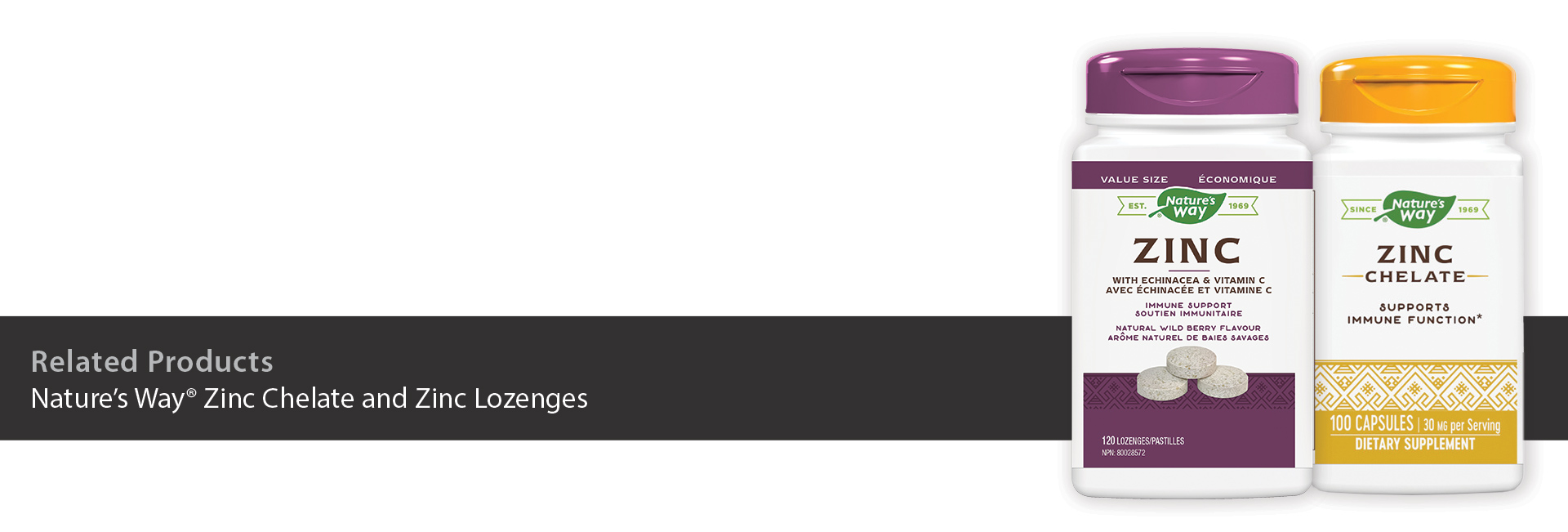

Zinc 101
You may have heard of zinc. Zinc is an essential mineral that is naturally present in some foods such as red meat, beans, nuts, certain types of seafood (oyster, crab and lobster), whole grains, dairy products, added to others (fortified breakfast cereals), and is also available as a dietary supplement1.
Zinc is involved in numerous aspects of cellular metabolism. It is required for the catalytic activity of approximately 100 enzymes, and it plays a role in immune function, protein synthesis, wound healing, DNA synthesis, and cell division2. While about half of the total body zinc is in the bones, the skin contains nearly 6% of total body zinc3. As movement of zinc across various tissues is limited and there is no storage depot, the continuous external supply of zinc is important for metabolic needs, growth, and tissue repair1,3.
Did you know that the bioavailability of zinc from vegetarian diets is lower than from non-vegetarian diets?5 Since vegetarians do not consume meat, which is high in bioavailable zinc, they often do not get enough zinc from their diets5. In addition, vegetarians typically eat high levels of legumes and whole grains, which contain phytates that bind zinc and inhibit its absorption5.
Zinc helps keep your immune system strong, it affects multiple aspects of the immune system, from the barrier of the skin to gene regulation within lymphocytes6,7. Zinc is crucial for normal development and function of cells mediating nonspecific immunity such as neutrophils and natural killer cells8. Research shows that adequate zinc intake is essential in maintaining the integrity of the immune system and zinc supports in the development and function of cells that mediate both innate immunity (neutrophils, macrophages, and natural killer cells) and adaptive (B-lymphocytes and T-lymphocytes) immune responses9. Since zinc is necessary for immune cell function and cell signaling, a deficiency of zinc can lead to a weakened immune response and therefore, zinc-deficient individuals can experience an increased susceptibility to a variety of infectious diseases10.
If you are considering taking a zinc supplement, Nature’s Way offers a variety of zinc products. Nature’s Way Zinc Lozenges help maintain immune function with the added benefit of Vitamin C as an antioxidant for the maintenance of good health. Nature’s Way Zinc Chelate also supports the immune system. Nature’s Way Zinc Chelate and Zinc Lozenges are bottled in 97% post-consumer recycled plastic.
Before taking any health supplements, be sure to talk to your doctor or other healthcare professional.
References:
1. Institute of Medicine, Food and Nutrition Board. Dietary Reference Intakes for Vitamin A, Vitamin K, Arsenic, Boron, Chromium, Copper, Iodine, Iron, Manganese, Molybdenum, Nickel, Silicon, Vanadium, and Zinc . Washington, DC: National Academy Press, 2001.
2. Prasad AS. Zinc: an overview. Nutrition 1995;11:93-9.
3. Gupta M, Mahajan VK, Mehta KS, Chauhan PS. Zinc therapy in dermatology: a review. Dermatol Res Pract. 2014;2014:709152. doi:10.1155/2014/709152
4. Rink L, Gabriel P. Zinc and the immune system. Proc Nutr Soc 2000;59:541-52.
5. Office of Dietary Supplements – Zinc. Ods.od.nih.gov. https://ods.od.nih.gov/factsheets/Zinc- HealthProfessional/. Published 2021. Accessed November 17, 2021.
6. Solomons NW. Mild human zinc deficiency produces an imbalance between cell-mediated and humoral immunity. Nutr Rev 1998;56:27-8
7. Beck FW, Prasad AS, Kaplan J, Fitzgerald JT, Brewer GJ. Changes in cytokine production and T cell subpopulations in experimentally induced zinc-deficient humans. Am J Physiol 1997;272:E1002-7
8. Shankar AH, Prasad AS. Zinc and immune function: the biological basis of altered resistance to infection. Am J Clin Nutr. 1998;68(2 Suppl):447S-463S. doi:10.1093/ajcn/68.2.447S
9. Maares M, Haase H. Zinc and immunity: An essential interrelation. Arch Biochem Biophys. 2016;611:58-65. doi:10.1016/j.abb.2016.03.022
10. Fischer Walker C, Black RE. Zinc and the risk for infectious disease. Annu Rev Nutr. 2004;24:255- 275. doi:10.1146/annurev.nutr.23.011702.073054

